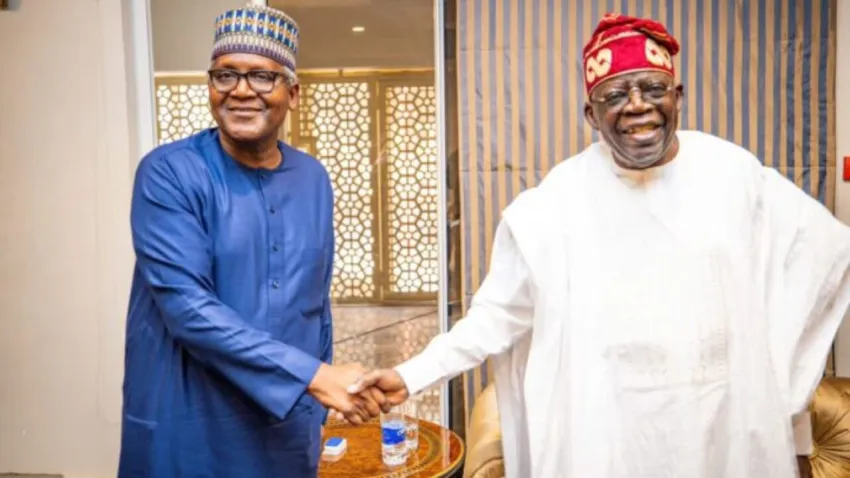South-South Nigerian stakeholders are intensifying their demands for President Bola Tinubu to take decisive action against those allegedly undermining the nation’s oil industry, particularly in light of recent challenges faced by the Dangote Refinery.
These calls are driven by growing concerns that oil magnates may be deliberately sabotaging Nigeria’s refineries, including the newly inaugurated Dangote Refinery, to protect their own financial interests.
Joseph Ambakaderimo, Chairman of the Board of Trustees for the Communities’ Development Committee of the Niger Delta, has sharply criticized the difficulties confronting Dangote Refinery. Ambakaderimo believes these challenges are not coincidental but rather a deliberate effort to sabotage a transformative development in Nigeria’s oil sector. He asserted, “The breeze is blowing and the rump of the chicken will be exposed,” indicating that vested interests are behind these disruptions due to fears over the refinery’s potential. He has called on authorities to track down and prosecute those responsible for this alleged sabotage.
Donald Inwalomhe, Executive Director of the Justice Research Centre (JRC), has accused the so-called oil industry mafia of obstructing Dangote Refinery’s operations. Inwalomhe argues that these beneficiaries of fuel subsidies are attempting to undermine refineries in Warri and Port Harcourt to protect their profits from imported petroleum products. He claims that this resistance extends to modular refineries as well. Inwalomhe urges federal officials, legislators, and state governors to support Dangote Refinery and promote the establishment of modular refineries to reduce the nation’s dependence on imported fuels.
Zik Gbemre, Coordinator of the Niger Delta Peace Coalition (NDPC), has condemned what he perceives as a deliberate effort to sway public opinion and justify further increases in fuel prices. Gbemre questions why regulatory issues are emerging precisely as Dangote Refinery begins production, suggesting these problems are part of a broader scheme to maintain the status quo and obscure the truth.
Dr. Onyienfie Jonjon, former president of the Ijaw Youth Congress, highlights the economic implications of the conflict between Dangote and regulators. He contends that the entrenched interests within the oil cartel view Dangote’s success as a threat. Jonjon advocates for President Tinubu, in his capacity as Minister of Petroleum, to mediate between the Nigerian National Petroleum Corporation (NNPC) and Dangote Refinery to find a solution that benefits both the country and its investors, despite his opposition to monopolies.
- ENVIRONMENTAL DEGRADATION: Court awards N20 million damages against UNN, Viagem Property
- Urgent Matters General Ike Nwachukwu Must Address as the Chairman of UNN Governing Council
- Notable Nollywood Actor Among Billionaire Kidnappers Killed by Police in Lagos
- Eddie Nketiah Ready to Quit Arsenal for Marseille, Joining Mason Greenwood
- Where did Seun find his courage?
- Arsenal Set to Sign Riccardo Calafiori After Reaching Agreement with Bologna
The public criticism of Dangote Refinery by the Nigeria Midstream and Downstream Petroleum Regulatory Authority (NMDPRA) has shocked Presley Idi, Secretary of the Ndokwa National Youth Movement. Idi laments the negative impact such public disputes have on Nigeria’s international reputation and speculates that the issues may stem from internal power struggles rather than genuine concerns.
Human rights activist Saviour Akpan argues that the ongoing conflict serves as a distraction from deeper systemic problems within the oil industry. Akpan condemns the media-driven strategies and calls for a focus on accountability and transparency.
Iniruo Wills, Co-Convener of the Embassara Foundation, suggests that legal and technical frameworks, along with existing dispute resolution mechanisms, could address the disagreement. Wills raises concerns about whether adequate business plans and feedstock commitments are in place, emphasizing the importance of thorough documentation and agreement enforcement.
Former commissioner Surv Furoebi Akene has demanded a comprehensive investigation into the management and regulatory oversight of Nigeria’s petroleum industry. He believes that the success of the Dangote Refinery could unearth long-standing corruption and inefficiencies and urges the government to scrutinize the operations of regulators and business owners.
Festus Oritsetimeyin, an influential figure in Warri, observes that the persistent issues reveal underlying motives that may obstruct profitable commercial ventures. He criticizes the refinery for allegedly lacking the proper license and accuses the current friction of exposing personal interests and greed that threaten national progress.
These stakeholders’ unified outcry underscores a deep dissatisfaction with Nigeria’s oil industry and highlights the urgent need for a comprehensive investigation and reform to restore efficiency and integrity to the sector.




